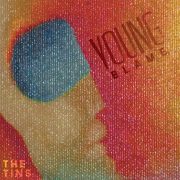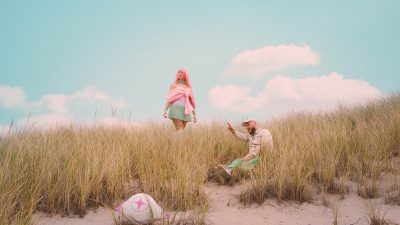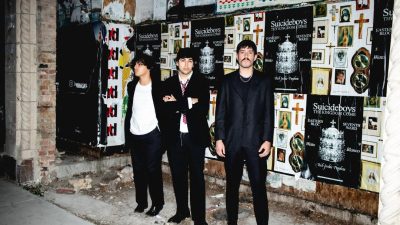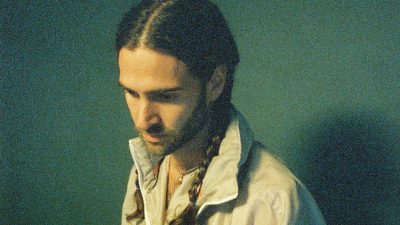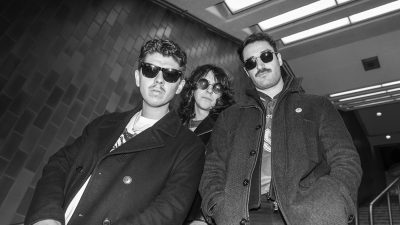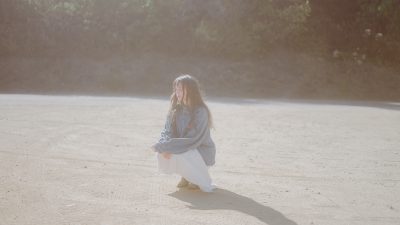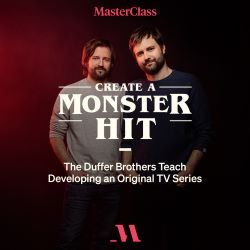Juan Wauters by the water: The North American poet takes the stage at 4Knots
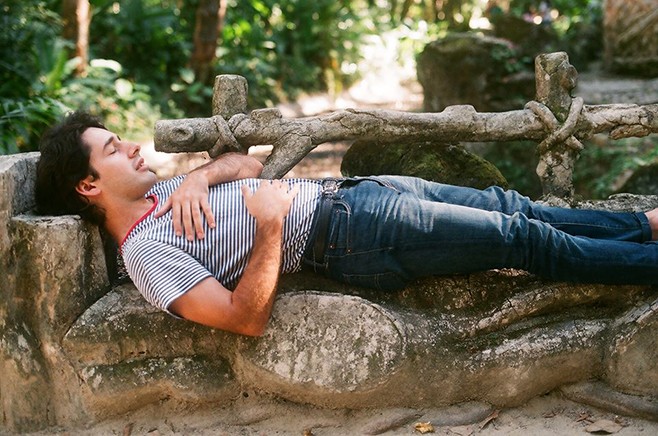
by Caitlin LoPilato
As 4Knots Festival swallowed lower Manhattan’s South Street Seaport on Saturday afternoon, Juan Wauters humbly graced the Fulton Street stage, sporting a short-sleeved button down and an adorably contagious grin. With a homemade backdrop displaying a few flags and quilts, Wauters independently played a handful of songs from North American Poetry, his February-released debut album, before being joined by Israel-born artist Carmelle Safdie and Mexican flutist Amanda Rodi.
Wauters carries an appreciative, satisfied essence. As a native of Uruguay, much of his music is sung in Spanish, paying homage to his roots. His musicianship is wholesome and organic, and though his songs seem simple in nature, a closer listen shows intimate emotional depth that’s both intriguing and refreshing. As he strummed his guitar and warmheartedly sang to a few thousand onlookers, it was easy to sway along to the pretty melodies and become compelled by his playful artistry.
We sat down with Wauters after his performance to talk about his musical past, his home neighborhood in Queens, and his educational transition into a solo career.
Caitlin LoPilato: You spend a lot of time on the road, what’s the coolest or most interesting city you’ve been to?
Juan Wauters: I like Seattle a lot. I like how it’s cloudy and the [ground] is always wet, and the temperature is a little breezy. That creates a certain vibe within the city, and the people are kind of dark.
CP: The neighborhood of Jackson Heights plays a large role in your music. How do you think your music would be different if you hadn’t moved to that particular neighborhood when you were younger?
JW: My friends and I always think about that. I have a lot of friends from Jackson Heights, and they always say, “I wonder who you would be if you had moved to Bay Ridge or even Bushwick, where there’s a lot of Hispanic people.” I would be completely different. Jackson Heights has a lot of people from all over the world, so everyone’s very respectful about each other’s space, since we all live together. There are a lot of supermarkets, and everyone cooks their own food. The quality of life there is good.
CL: You used to be in a punk-rock band called The Beets, was it hard to make that transition into a solo career?
JW: I’ve always recorded on my own, so recording wise, it wasn’t so hard. What’s been challenging and kind of fun is figuring out how to perform under my name and what that means to me. I’m learning to control other people’s playing and convey my ideas musically, but I really don’t want to be like, “Hey, play this or play that,” because that’s not my nature. It’s been challenging, but a lot of fun, because during these times of discovery is when you learn the most.
CL: What’s the most important thing you’ve learned?
JW: I’m always trying to learn how to let go when I play and feel the moment. Playing by myself, nobody really has to follow me and I don’t have to follow anyone, so that gives me a freedom I’ve always tried to reach through music. It’s hard to achieve but I’ve been working a lot.
CL: North American Poetry was your debut album that came out in February. Do you have any more music in the works that you plan on releasing soon?
JW: We recorded with Carmelle, who’s featured on North American Poetry. The two of us did a 15 minute recording flowing from song to song, alternating who sings lead, and we want to release it through [Captured Tracks], but we’re talking about it. It’s kind of risky, because it costs a lot of money, but we’ll see. I’m also trying to record while I’m here [in New York] for a couple weeks. I have a lot of material I’ve been sitting on.
CL: It seems that your musicianship comes very naturally to you. Has it always been that way?
JW: Yeah, it’s always been that way. I’ve never had to go through a point where I had to force myself to write a song. It’s always been like I had an idea and slowly it developed into a song. I take a lot of tricks from bands like the Beatles, the Rolling Stones and the Ramones, but I still don’t want my music to sound like anyone but me.


